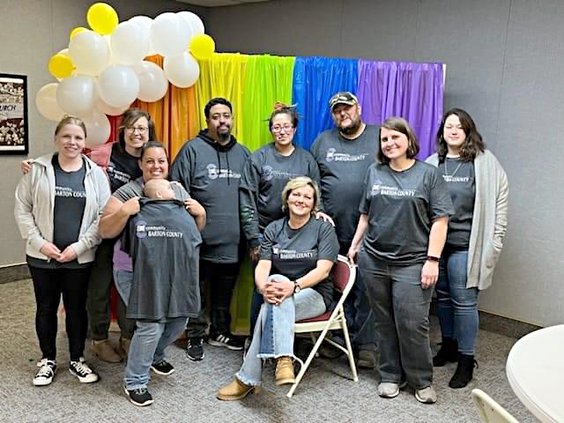Editor’s note: This is the first in a two-part series examining the issue of poverty in Great Bend, its causes, and those in the community working toward solutions.
No one sets out to live in poverty, says Core Community Resource Coordinator Amanda Howard, but all too many people in Great Bend find themselves caught the cycle. And Howard, a success story breaking the cycle of poverty, knows first hand the difficulty of both living in poverty, and trying to escape from it.
She said there’s a lot most people don’t understand about the complex reality of living in poverty and trying to break free from it.
By the numbers
According to data from the 2020 U.S. Census, 15.3% of Great Bend’s nearly 15,000 residents live below the poverty line, which is $23,030 per year for the a family of three, $27,750 for a family of four.
Many more live just above that line, not in poverty but with households making below a what is considered a living wage. According to a 2019 area-specific study by MIT is a minimum of $54,559 a year before for a household of three, and goes up from there based on household demographics. This is equivalent to two parents, both working full time, making just over $13 per hour.
By comparison, the median household income in Great Bend, according to the 2020 U.S. Census, is just $46,659 a year, more than $14,000 below the state average of $61,091. Sara Hayden, director of Great Bend Economic Development, Inc. noted that more than half, roughly 53%, of families in Great Bend, live in the low- to moderate-income range.
Many, in fact, are families with children. According to the Kids Count Data Center, 17% of kids 17 and under in Great Bend live in families with an income below the poverty line. More than half, 54.8%, of USD 428 students, qualify for free lunches, according to Kansas Department of Education statistics from the 2019-2020 school year, which, according to KSDE standards, means those students live at or below a household income level of 122% of the poverty line.
Education is another issue. Only about 20% of adults 25 and older in Great Bend possessing a bachelor’s degree or above, a statistic which is more acute to those in poverty who often have limited, or no, access to higher education. Thus, many of the jobs available to those in poverty are low to moderate wage jobs with little opportunity for advancement.
A complex problem
The faces behind these statistics are diverse. Many, like Howard, are born into situations where poverty is the norm they live with, and the causes and drivers of poverty are much more complex.
Amy Boxberger with Central Kansas Community Corrections cautions about making generalizations in regards to the role of crime and addiction in the lives of those in poverty.
Though Boxberger said the need for money can lead to an increase in the chances of behaviors such as addiction or criminal activity, she said it is a mistake to assume that those in poverty routinely engage in these types of activities.
According to Alana Blessing, a family support worker with Park Elementary School, in children coming from these households, the stress of poverty can manifest in a variety of ways. They often show increases in depression and anxiety. The can lead students to poor attendance, less tolerance behaviorally in the classroom, and poorer academic performance. Blessing said there is often an noticeable change in demeanor for these students.
Poverty, Boxberger said, is a vicious cycle, that once a person is in it, can be extremely difficult to escape. It can take as much as 2-5 years to emerge successfully from poverty.
Hyatt agreed, saying problems that at the middle class level may seem to have easy solutions, such as paying a ticket, can easily compound for someone in poverty who doesn’t have the money to pay for basic things such as car insurance, but still has to find ways to get to work and get to school. One simple event most take for granted can have disastrous consequences for someone in poverty.
“‘I have to give my kids those meds, I have to pay the electric bill or they’re going to turn it off, I have to pay rent, or I’m getting evicted,’ and it’s hard for them to see (even) one week or two weeks ahead,” said Rachel Hyatt, Site Director for ESSDACK/Barton County Academy.
Even having a sick child presents more difficult choices and challenges.
Many of the jobs they work do not afford them paid time off to care for family. Because in many situations, those in poverty are sole breadwinners for a family, they must decide whether to stay home and care for family or go to work. This is an conundrum only made worse during the mandated quarantines that came along with COVID-19.
Health care is another issue. A single parent in poverty will most likely seek medical care for their children and family members, while without the resources to take care of their own health. Because of that, their own health is likely to suffer, leading to higher instances of absenteeism.
“The kid might qualify for health care assistance, but the (parent) doesn’t, but if you have sick kids, who do they pass it to?” Boxberger said.
Hyatt said its often for difficult for those who have not lived these situation to understand the stress and sense of desperation those living in poverty feel on a daily basis.
Blessing agrees, saying its hard to comprehend the experience of poverty if you haven’t been through it.
It is also a misnomer to think those in poverty think only of themselves. In fact, Boxberger said, it is just the opposite. Relationships are a key driver of poverty. They don’t want to let people down, so Howard said those in poverty will often sacrifice what little they have so that someone else does not have to go without, even at the cost of their own financial, physical and emotional well-being.
Putting a face to the numbers
Amanda Howard was one of those faces. Growing up, the family was not in extreme poverty, but in a two-parent family with five kids, a dad working and a mom staying home, the family struggled to get by.
“We were always right there on the brink, where money was tight,” Howard recalled. “We had what we needed, but it wasn’t a whole lot more than that.”
Tension was constant, and alcoholism and addiction, triggers common to poverty, were present, and her and her siblings were never taught about how to manage money. As she graduated school and left home, the cycle of addiction took hold in her life early on.
Even now, though, the details of those struggles are difficult to put into words, and many of the details are still painful to recall.
Though she tried to go to college, her fiance’s cancer diagnosis brought her back home, and back into the destructive cycle, one she said it took her nearly 12 years to get out of.
The cycle took her into a life away from her family, in and out of destructive relationships, out of work, and living without basics such as water and electricity, not knowing where her next meal might come from.
Eventually, though, she made the decision to get clean and sober and turn her life around - she’s been sober now for close to two years. But sobriety, she said, didn’t mean an end to the difficulty.
Poverty, Howard said, comes with a lot of unseen trauma and scars, and addiction is only a small part of that. Post-traumatic stress disorder (PTSD) is a lot more common among those in poverty than people might realize.
Boxberger said abuse, human trafficking, addiction, and systemic racism, all social issues which are closely tied to the issue of poverty as a cause or a byproduct, are dark sides to the issue of that many don’t like to talk about.
Howard also said its a misconception that people living in poverty are lazy or don’t want to work to get out of it. Often, instead, they are hard-working, deeply caring individuals caught in a vicious cycle trying to get by the best they know how, but caught in destructive patterns.
“When you’re stuck in the cycle from a young age, and don’t know anything else, you just do the best you can with what you have,” Howard said. “It’s (a life of) wanting more and knowing how to get it.
Next, practical solutions for addressing the issue of poverty in Great Bend will be addressed. What is being done about the issue, and what can the community do?





